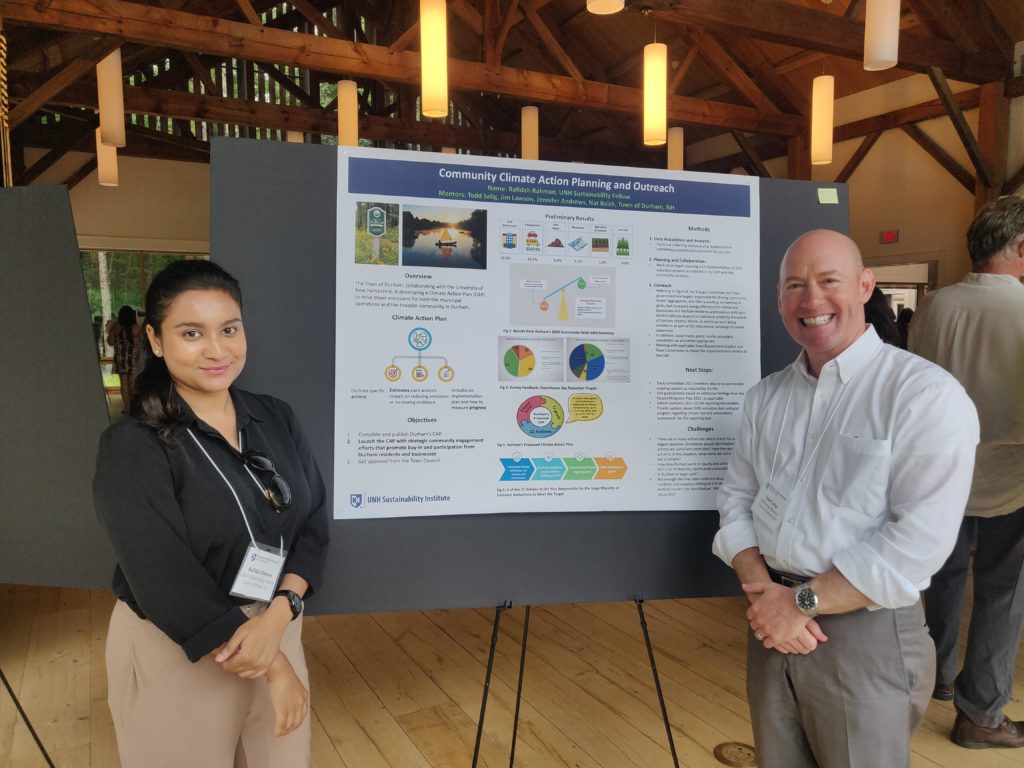
Rafidah Rahman
University of New Hampshire (UNH) Sustainability Fellow – Town of Durham, New Hampshire
Each summer, UNH Sustainability Fellows are paired with municipalities, educational institutions, corporations, and nonprofits in New England to work on transformative sustainability initiatives. I was matched with the Town of Durham, where I assisted with community climate action planning and outreach efforts. During my work to finalize the climate action plan and to guide its adoption and submission to the Global Covenant of Mayors (GCOM), I created an article series to promote community buy-in, inspiring climate action within and beyond Durham. By participating in these efforts, I became familiar with GCOM and other leading platforms for the requirements of the Climate and Energy Framework and sustainability reporting. Recently, I was offered the opportunity to extend my position until spring 2023. Between now and then, I will continue with my work on community climate action planning and outreach, but I will also assist the municipality with developing their greenhouse gas inventory.
Sustainable development is not only about meeting human development goals. It is also about maintaining the natural systems that provide resources and ecosystem services that are vital to an economy and society. Through my work with the Town of Durham, I am supporting local actions that both contribute to emission reductions and build community resilience, thus improving the quality of life for local residents while also moving the United States towards meeting its commitments under the Paris Climate Agreement.
My favorite aspect of the MS Sustainability program is that it’s so interconnected. You can apply knowledge from one course to another and then apply it to your work. For example, I was able to make a stronger case for some of the energy-efficiency writing I am doing for my job by using the Global Carbon Abatement Curve we studied in our Economics for Policy and Planning course. My work at the Town of Durham is also clearly benefiting from courses like Systems Thinking and Climate Policy and Planning, which provided me with a deeper understanding of sustainability frameworks and how climate and environmental issues are interrelated across local, state, and federal levels.

Charlie Suse
Research Associate – Bluefield Research
This summer, I’m interning with Bluefield Research in Boston, an independent insight firm that focuses exclusively on water markets. Currently, I’m conducting research on the private water sector, gathering and analyzing data on private ownership of public water and wastewater systems in the US and assessing public-private partnerships for major water infrastructure projects in Mexico. Private water is a highly controversial topic in both countries, so it’s been particularly insightful to dive deeper into the different factors driving private companies to acquire and invest in municipal water systems.
Between aging infrastructure, water shortages, and climate change, more sustainable solutions are needed for utilities to navigate this myriad of challenges. While public utilities often lack the resources to afford critical infrastructure upgrades, private companies are jumping on the opportunity to enter the market. Understanding this landscape is critical to developing policies that manage water more sustainably, while securing clean, affordable water for communities most impacted by climate change. The MS Sustainability program has been immensely helpful in teaching me to approach water problems through a systems lens–recognizing the different components, drivers, and actors that make up a watershed. From using GIS to map out privately-owned community water systems to assessing the equity considerations of water conservation mechanisms, the MSS program has provided me with so many useful tools to help both private companies and local governments manage water more sustainably.